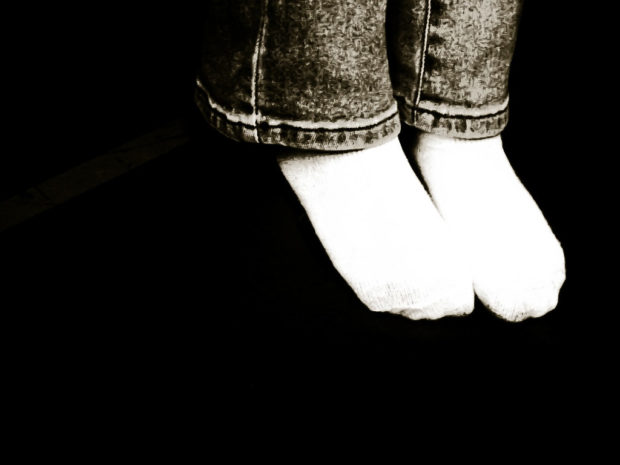You have no items in your cart. Want to get some nice things?
Go shopping
The year Gert turned eight all the girls had a favourite Monkee. Most favoured Davy Jones, some liked Peter Tork, and a few Mike Nesmith. Micky Dolenz was too brash and American to be a favourite.
Gert lived in a terrace of tall houses with outside toilets. On good days Gert’s mum referred to the outside toilet as the garden toilet. Not that anyone gardened. Gert’s back yard was a mess of weeds and brambles and the leftover bomb shelter had too many mice to be a clubhouse of the sort in children’s books. Behind the bomb shelter was the absolute wild. A cratered ground where people dumped old prams and household junk. Beyond the absolute wild was Abercrombie Street, the roughest and most dangerous street in Luton. Luton was a General Motors town, a scar on the Chiltern Hills, said Mum.
Gert, a solid girl with dark hair and a nose with a large bump in the middle, sat on a dining room chair dressed for school. Mum wore rubber corsets and, like a tank with a waist, nudged and jabbed Gert from behind as she plaited her hair.
“Sit still, it’s not easy making anything decent out of a sow’s ear,” said Mum. “This hair’s a tangled mess.”
“Ow!”
“Serves you right. Will you sit still? No.”
“I could wear it down.”
“School rules say plaits.”
“Other girls wear their hair down.”
“And if other girls jumped in front of buses would you jump in front of buses?”
“No one cares.”
“Sit still and don’t talk back,” said Mum and whacked her with the plastic comb. “And there’s another one where that came from.”
Gert stared into the wallpaper, her dark brown eyes amplified by brown plastic-frame glasses. When she smiled, Gert flashed stick out teeth, “an attractive overbite,” Mum said. Gert wanted braces like her older sister; Mum said no because her sister’s braces had caused permanent inner mouth damage. Gert’s sister worked in Marks & Spencer. In Manchester! Abandoning Gert.
Outside, Gert checked Lola Grace’s house for danger. Lola Grace Mason, also eight, lived two doors down. Gert walked fast and held her breath for good luck. She cleared Lola Grace’s house. Safe. She closed her eyes and imagined walking hand in hand with Davy Jones; her name was Mandy. Footsteps. Gert walked faster. Lola Grace overtook Gert and walked backwards, facing her, staring her down. Then Lola Grace fell in beside her. Silence. Lola Grace veered closer and closer, and Gert edged towards the road which wasn’t busy but had enough cars to be a threat. Lola Grace was small but unwieldy and, like her name, took up double the space of other girls. Gert hung back. Lola Grace hung back. There were puddles in the gutter. Lola Grace lurched towards Gert and stamped in the puddles. Tears prickled Gert’s eyelids. Her socks had been snowy white.
Lola Grace’s socks looked like they were worn until they fell to pieces, so said Gert’s Mum. Today Gert could see ketchup puddling against Lola Grace’s left shoelace. Gert’s Mum boiled whites in a copper on the gas stove, every Monday. She hung them on the clothes line, fourteen pairs of righteous, bright white socks glowing in the sun. If it clouded over, they were brought inside. If it rained and they got wet they were washed again. Mum said even a good boil couldn’t save Lola Grace’s socks. Mum prided herself on boiling her whites. Now Gert’s socks were muddy.
In sewing class, Gert’s pink embroidery cotton knotted itself on the back of the even weave burlap. The teacher leaned over and took her sampler out of her hands. Gert shivered with fear.
“If you keep this part of the thread really short it won’t bunch up. Do you see, Gert?”
Gert nodded and tried to smile with her mouth closed. “Keep up the good work.”
“Thank you,” whispered Gert.
School lunch was fish sticks and potatoes and baked beans followed by bananas and custard. Gert sat with Lizzie Horton who was almost her best friend. They planned to walk home together, a defence against Lola Grace. Baked beans were Gert’s favourite.
Gert loved maths, the way everything added up and made sense. She understood numbers. That afternoon, she coughed. If she coughed when she got home, she wouldn’t be allowed outside to play. She coughed again. Someone tapped her head. She held her breath and looked up. The teacher slipped three cough sweets into her hand. She smiled, teeth out, and sucked on one.
Back home, Gert opened the door slowly. Her plan was to get to her bedroom and change her socks before mum saw. She wasn’t sure what she’d do next. Wash the socks in the bathroom sink? Throw them away?
“Hey! Let me see those socks.”
“I got splashed.”
“You weren’t careful!” Gert swallowed, tried not to cough. “Don’t know why I bother. You don’t care about your socks. Your father doesn’t care. Only I care.” Gert thought Mum’s corset might burst from anger. “Get out of my sight. I give up. Wash your own socks!”
Sometimes when Mum got cross she cried. Other times she slammed the door and went for a walk. Said she wouldn’t come back. Yelled really loud. Like the time Gert smuggled a bracelet to school to wear and it got tangled up in her sweater, or when she got a silver star instead of gold on her homework, or chewed with her mouth open. Once when Gert was four and Mum was polishing the lino, down on her hands and knees, Gert climbed on her back and hugged her, kissed her.
“Get off me!” she grumbled. “Don’t touch me! What are you doing? Get away from me, you’re ruining everything.”
Gert realised mums were strange people, triggered by the unexpected and quick to ruin a day.
Mum went to her bedroom, too upset to hear Gert cough.
Gert grabbed some bread and jam and the seat for her swing and headed outside. The best part of Gert’s house was the small almost flat piece of grass, close to the living room window, where the swing stood. Gert’s father brought the swing home for her fourth birthday. It was made of metal by someone from his work. A chain hung from a metal crossbar. Dad had cut two Vs into the seat and it slotted almost neatly onto the chain. Gert was told to bring the seat in the house when she was done swinging.
Dad sold vacuum cleaners door to door. He’d been made redundant from selling them in a shop. He bought a bubble car with his redundancy money, and Mum didn’t speak to him for a week because it was made in Germany and Mum’s brother had died in a POW camp in Japan. It was all connected. Mum bore a good grudge. Gert liked the bubble car even if people laughed at it because it only had three wheels. It was pale blue. Gert didn’t like that Dad was away five and sometimes six nights a week doing a bad job of selling vacuums.
“Everything alright?” Dad would whisper when he came home.
“Yes,” answered Gert, whatever happened.
If Mum heard him, she’d shout, “What do you mean is everything alright? Of course it’s alright. Do you think we can’t manage alone? Tell your father we make out fine without him. Go on, tell him.”
“Everything’s fine.”
“Thought as much,” said Dad.
He’d pore over the employment ads in the Luton News, searching for something in town, but the year Gert was eight there weren’t many jobs locally. Not for Dad.
Gert swung and wondered if Mum would make tea that night or if it would be bread and jam and bed. She looked at the house two doors down and blamed Lola Grace. Lola Grace was a bully whose mother didn’t clean her socks properly. Gert’s mum was an ace cleaner. She could win awards. Gert still remembered when the television repairman came because the horizontal hold wasn’t working and the pictures were squeezed in the middle. Mum was horrified when he took the back off the set.
“Look at all the dust,” she chirped and grabbed a duster.
“No!” he said. “Too static. You’ll wreck it.”
Mum froze, like an animal stalking prey, desperate to dust. The television repair man talked her down.
“It’s always the clean houses that have dusty televisions, you know?”
Her duster was poised for attack.
“Dirty houses, where people don’t care about cleaning, the dust isn’t disturbed, doesn’t get in the set,” said the repair man. He was crouched behind the set ready to throw himself on the duster and disarm her if she got any closer.
Mum slowly relaxed, turned, and concentrated on the picture of the Queen that hung over the dining room table. She dusted the tiara area with all the nonchalance of a woman unconcerned by dust wafting into the television.
These days Mum only went outside for medical appointments. The doctor gave her pills to sleep, pills for her nerves, and suggested she get a job. She didn’t.
Gert swung and daydreamed. She had two cough sweets in her pocket and felt lucky. She dared Davy Jones, who was on an invisible swing next to hers, to swing around the world. She watched the windows of Lola Grace’s house when she swung. They looked dark and dusty, black holes against the night. Gert’s house had dull honey-coloured windows illuminated by 60 watt bulbs and blanketed in shades of brown and mustard. Lola Grace put the lights on herself before she came out. She would swing till bedtime or until Mum found herself again and offered food. Gert figured that the next time Lola Grace pushed her off the path and laughed, the next time she used a pea shooter to sting her with dried peas, the next time she splashed her snowy white socks, the next time she’d say, “Don’t. Be nice.”
Gert always looked for, but never saw, Lola Grace in the yard. She stayed inside the house like a prisoner. When Gert swung high she could see Lola Grace’s back entry, near the toilet, see people coming out to use it.
The noise started low at first, low groans like a hurt animal or maybe a baby. Did someone have a baby? Was Lola Grace’s mum fat? Maybe she had a new baby. The groans got louder, shifted into a moan.
“Please…,” said a voice. Gert looked around. Who said please? “Please don’t take me,” said the voice.
Gert identified the words between little hiccupping sobs. She swung extra high and the ground heaved around the steel plates that were buried in lumps of cement and meant to stabilize the swing. She could see Mrs. Mason holding onto the toilet door and two men trying to pull her away.
“I don’t want to go. I don’t want to go.”
Gert knew she should go inside. She swung higher.
“Get your hands off me, you fucker.” Gert wasn’t meant to listen to certain words. Fucker was definitely on the list. The swing was about to leave the ground. “Don’t touch me.”
A wail cut through Gert’s cardigan and dress and skin and all the way to her insides.
“Piss off! Fuck off! Get away from me…Piss. Fuck. Get off.”
Gert swung higher; the swing set clumped back to earth with a wallop every time she swung through. Each time she breathed a sigh of relief.
“No, no, no, no.” Gert heard the saddest tears. They froze her heart and made her think one day she might become a doctor.
Somewhere there was a thumping sound. It came from the door to Gert’s living room, the one Mum called a French window, but it was really a door.
Gert peered upwards like she’d heard a mysterious noise in the sky, a sickly airplane. But she knew her time outside was numbered. More thumping.
“Get your fucking hands off me. I don’t want to go,” wailed Mrs. Mason.
“Gert!” Mum had opened the window, furious, and beckoned her to get inside.
Gert stopped the swing with the toes of her shoes. They scraped across the mud where the grass was worn away by her feet.
She slowly picked up the seat. If it rained and she forgot to take the seat in, Mum got angry.
Gert dawdled towards the house, half on tippy toes, stretching her neck to see into the Mason’s yard. Mum banged on the window. Preoccupied, Gert looked innocent and careful walking towards the house.
“I don’t want to go. Please, please…” The voice was small and hidden in tears.
“You took your time,” said Mum. “Lock the door.”
Gert bolted the back door, and they went to the front room, used only for guests, Christmas, and hiding from the enemy. The room had a bay window, and when they didn’t have money and the Tinkers came to the door selling charms and good luck, Mum and Gert would hide in the bay. Every time the Tinkers knocked at the door, Mum flinched. She didn’t approve of hiding, she liked to buy charms and luck, but when there was no money, she hid, scared of being cursed.
Mum and Gert peeped out of the window. There was a funny little ambulance van outside. No marking but an ambulance man standing at the back door. Two more ambulance men waddled Mrs. Mason, who looked to be wrapped up in bed sheets, to the ambulance.
Gert and Mum couldn’t hear what was being said, but Mrs Mason was struggling not to get into the little ambulance. Gert looked at Mum. Her face was white, and she was picking the paint off the windowsill. Chip, chip, chip. Gert didn’t know what to do. Mum would be mad if she saw the chipped paint. Gert, ever so slowly, put her hand on top of Mum’s, expecting to be pushed away. Instead, Mum smiled at Gert. She looked like she had tears in her eyes.
That night Mum and Gert had beans on toast for supper. Beans twice in one day!
“What was going on?” asked Gert. “Outside.”
“I think,” said Mum putting down her knife and fork, “that Mrs. Mason had a medical appointment.”
“And didn’t want to go?”
“Exactly,” said Mum.
“Maybe an injection?”
Next morning Gert walked to school, hand in hand with Davy Jones. Her name was Jenny, and she wondered if she’d kiss him if he asked. She almost didn’t hear Lola Grace lumber up beside her. They walked in silence.
“Who’s your favourite Monkee?” asked Gert.
About Alexina Dalgetty
Alexina Dalgetty lives in Stratford, Ontario. Her short fiction can be read both online and in print. Publications include Agnes andTrue, Reflex Fiction, The Big Windows Review, and Fairlight Fiction.




